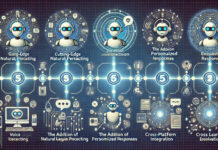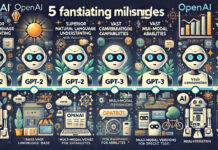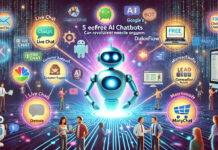Artificial Intelligence (AI) is revolutionizing gaming, making experiences more immersive and engaging. From improving graphics to developing smarter NPCs (non-playable characters), AI is changing every aspect of gaming. This article explores how AI is transforming the gaming industry, its benefits, and future implications.
Enhancing Graphics and Realism
AI significantly improves graphics and realism in games. AI algorithms create high-quality textures, lifelike animations, and realistic environments. These advancements make games more visually stunning and immersive.
Procedural Content Generation
Procedural content generation uses AI to create game content on the fly. This includes generating landscapes, buildings, and entire worlds. Games like “Minecraft” and “No Man’s Sky” use procedural generation to create vast, unique environments for players to explore. This ensures that no two game experiences are the same.
Realistic Animations
AI-driven animations make characters in games move more naturally. Machine learning algorithms analyze real-world movements and replicate them in-game. This results in fluid and realistic character motions, enhancing the overall gaming experience.
Smarter NPCs and Dynamic Gameplay
AI transforms how NPCs behave in games. Traditional NPCs follow scripted actions, but AI allows for more dynamic and responsive behaviors.
Advanced AI Algorithms
AI algorithms enable NPCs to learn from player actions and adapt their behavior. This makes gameplay more challenging and engaging. For example, in games like “The Last of Us Part II,” enemies use AI to coordinate attacks and react to player strategies, creating a more immersive experience.
Dynamic Storytelling
AI drives dynamic storytelling in games. Instead of following a linear storyline, AI creates branching narratives based on player choices. This results in a personalized gaming experience where the story evolves differently for each player. Games like “Detroit: Become Human” use AI to offer multiple story paths, ensuring high replay value.
Personalized Gaming Experiences
AI makes gaming more personalized. By analyzing player behavior and preferences, AI tailors the gaming experience to individual players.
Adaptive Difficulty
Adaptive difficulty adjusts the game’s challenge level based on the player’s skill. AI algorithms monitor player performance and tweak the game’s difficulty in real-time. This ensures that the game remains challenging yet enjoyable. Games like “Left 4 Dead” use adaptive difficulty to keep players engaged.
Customized Content Recommendations
AI recommends games, in-game items, or content based on a player’s preferences and playing history. This personalization enhances the player experience and keeps players engaged for longer periods. Platforms like Steam and Xbox Live use AI to provide personalized recommendations to their users.
AI in Game Development
AI is changing how games are developed.
Game Testing and QA
AI automates game testing and quality assurance processes. AI-driven bots play through games, identifying bugs and glitches that human testers might miss. This speeds up development and ensures a higher quality product.
Game Design Assistance
AI assists game designers by providing insights and suggestions. For example, AI can analyze player data to determine which game mechanics are popular or identify areas where players get stuck. This information helps designers create more engaging and user-friendly games.
Challenges and Ethical Considerations
AI offers numerous benefits but also presents challenges and ethical considerations.
Privacy Concerns
AI relies on vast amounts of data to function effectively. In gaming, this means collecting data on player behavior and preferences. Ensuring responsible use of this data and protecting player privacy is crucial.
Fairness and Bias
AI algorithms can sometimes exhibit bias, leading to unfair gaming experiences. Ensuring AI systems are trained on diverse datasets and developers work to minimize bias is essential.
Job Displacement
Automating certain game development tasks through AI might lead to job displacement for some developers and testers. Balancing AI use with maintaining human roles in the industry is important.
The Future of AI in Gaming
The future of AI in gaming looks promising, with continuous advancements expected to enhance gaming experiences.
Virtual and Augmented Reality
AI will play a crucial role in developing virtual and augmented reality (VR/AR) games. AI can create more realistic and responsive VR/AR environments, making these experiences more immersive.
Advanced NPCs and AI Companions
Future games will feature even smarter NPCs and AI companions that understand and interact with players in sophisticated ways. These AI entities will engage in meaningful conversations, remember past interactions, and adapt to the player’s playstyle.
Procedural Generation and Infinite Worlds
AI-driven procedural generation will become more advanced, creating even more detailed and expansive game worlds. This technology will allow for virtually infinite game environments, offering players endless exploration possibilities.
Conclusion
AI is revolutionizing gaming, creating more immersive and personalized experiences for players. From enhancing graphics and realism to developing smarter NPCs and dynamic gameplay, AI is transforming every aspect of gaming. As technology continues to advance, the future of AI in gaming promises exciting developments, shaping how we play and interact with games.
For further insights into AI and its applications, stay tuned to our series on AI technologies and AI News.



